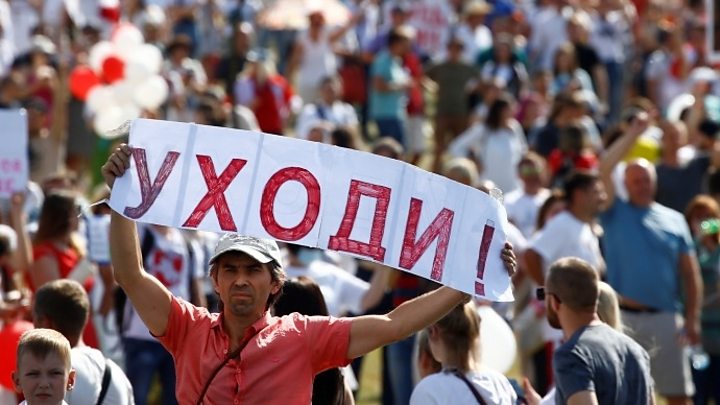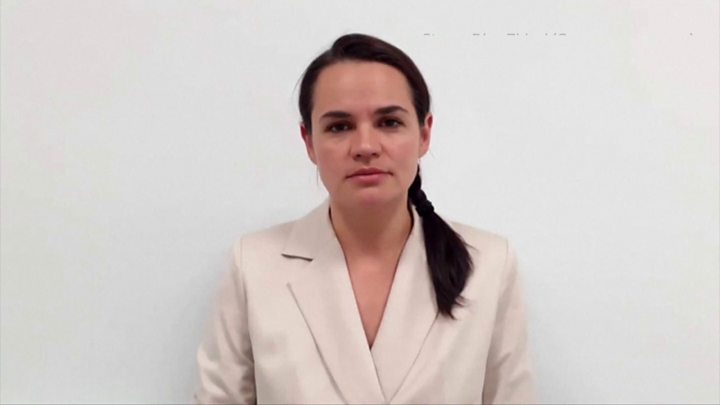
Media playback is unsupported on your device
Fresh strikes are expected in Belarus after a weekend which saw tens of thousands take to the streets to demand the departure of long-term President Alexander Lukashenko.
Opposition leaders called for the strikes as anger grows over reports of police violence as well as alleged poll-rigging in the 9 August vote.
But the president, who claimed a landslide victory, remains defiant.
On Sunday, he called on supporters to defend their country and independence.
However, protesters came out in far larger numbers, with local, independent news site Tut.by describing the peaceful demonstration as “the largest in the history of independent Belarus”.
- ‘Breathing freedom’ – Belarusians hope for change
- ‘If you croak we don’t care’: Brutality in Belarus
The wave of anger has been rising since the Central Election Commission said Mr Lukashenko, who has been in power since 1994, won 80.1% of the vote and the main opposition candidate Svetlana Tikhanovskaya 10.12%.

Media playback is unsupported on your device
Ms Tikhanovskaya insists that where votes were properly counted, she won support ranging from 60% to 70%. She left for the country after she publicly denounced the results, joining her children in Lithuania.
Meanwhile, some 6,700 people have been arrested in the wake of the election, and many have spoken of torture at the hands of the security services.
Workers at state-run factories walked out in solidarity with the protesters last week, and more are planned for this week, increasing the pressure on Mr Lukashenko, the BBC’s Kiev correspondent Jonah Fisher says.
What happened on Sunday?
Rival rallies were held in the capital, with local media reports suggesting that around 31,000 people took part in the pro-government event on Sunday. The Ministry of Internal Affairs estimated that the number was closer to 65,000.
Speaking to supporters, Mr Lukashenko said Belarus would “die as a state” a re-run of the election were to take place.
“You came here so that for the first time in a quarter-century you could defend your country, your independence, your wives, sisters and children,” he said.
He added that the opposition would “crawl like rats out of a hole” if they were not suppressed this time.
There were reports of state sector workers being forced to attend or face the threat of losing their jobs. For days, workers at state-run factories have staged walkouts and many have joined street marches against the president.
As the president spoke, around 220,000 anti-Lukashenko protesters gathered near the Stela Minsk Hero City World War Two memorial in central Minsk, according to news website Tut.by.
Supporters also turned out in other cities, following a call for weekend rallies from Ms Tikhanovskaya.
A number of officials, as well as current and former police officers, have resigned.
The Belarusian ambassador to Slovakia, Igor Leshchenya, declared his solidarity with the protesters.
However, he told the BBC he had “gloomy prophecies” about the government’s willingness to listen to protesters.
“It’s not evident that government is ready to hear” them, he said.
What’s happening internationally?
President Lukashenko has sought Russian help as the unrest continues.
On Saturday, Mr Lukashenko said President Vladimir Putin had promised to provide what he called comprehensive assistance in the event of external military threats to Belarus.
The two leaders had a second conversation on Sunday, in which the Kremlin said they discussed “the situation in Belarus, taking into consideration the pressure the republic was being put under from outside”.
Mr Putin told Mr Lukashenko Russia was ready to assist Belarus “in accordance with the collective military pact if necessary”.
More about the protests in Belarus
The long-time Belarus leader also voiced concerns over Nato military exercises taking place in neighbouring Poland and Lithuania and launched into a tirade against the Western military alliance.
On Friday, EU foreign ministers agreed to prepare new sanctions against Belarusian officials responsible for “violence, repression and the falsification of election results”. The US has also condemned the election as “not free and fair”.
Click Here to Visit Orignal Source of Article https://www.bbc.co.uk/news/world-europe-53796436


